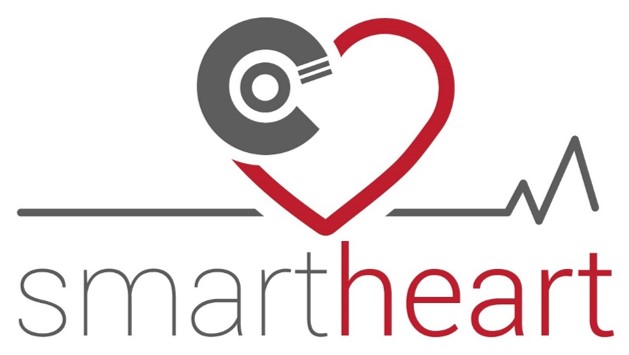SmartHeart Conference 2022
Friday June 17th, 2022
Join our one-day conference to learn about how SmartHeart researchers have been using machine learning methods to make MR cardiac imaging faster, smarter and more efficient.
Participation is free but registration is required.
Location: Imperial College London, South Kensington
UPDATE 8 JUNE 2022: Registration is now CLOSED.

Programme
09:00
09:30
Registration, refreshments and networking
Introduction and overview of the SmartHeart Project
Daniel Rueckert, Imperial College London & TU Munich
09:45
SESSION 1
MR fingerprinting: towards a virtual biopsy for cardiovascular MRI
Claudia Prieto, King’s College London
3D multi-parametric whole heart MRI: simple, fast and efficient
René Botnar, King’s College London
AI-enabled cardiac imaging quality control
Julia Schnabel, King’s College London & TU Munich
Pathways from MSK to Cardiac MRI Reconstruction
Kerstin Hammernik, Imperial College London & TU Munich
10:45
Coffee & Poster Session
11:30
SESSION 2
AI-enabled cardiac functional quantification
Andy King, King’s College London
Modelling the Shapes for 100,000 Hearts
Wenjia Bai, Imperial College London
Learning left ventricular motion patterns from cardiac MR image sequences
Alison Noble, University of Oxford
12:15
KEYNOTE TALK I
Enabling precision medicine through multiscale modelling and simulation
Blanca Rodriguez, University of Oxford
Precision Medicine aims at providing the most accurate diagnosis and best treatments for each patient. Whereas this has primarily been genomic-centred so far, there is now a wide recognition of the need to consider a wide spectrum of lifestyle, environment, and biology conditions. Characterising such diversity of factors requires large quantity and quality of patients’ datasets, and at the same time, innovative approaches for their analysis, drawing on the increasing power of computers and algorithms. New concepts are being proposed, such as the Digital Twin and In Silico Drug Trials. In this presentation, I will address this framework for cardiology and pharmacology, highlighting how combined computational approaches including image-based multiscale modelling and simulation can boost the capacity for diagnosis and prognosis, as well as future treatments.
13:00
Lunch
13:45
KEYNOTE TALK II
An industry perspective on AI in CMR
Christian Geppert, Siemens Healthineers
14:30
SESSION 3
The impact of AI for analysis in population studies using UK Biobank data
Nay Aung, Barts Health NHS Trust & Queen Mary University of London
The impact of AI in clinical CMR
Amadeo Chiribiri, Kings College London
AI Research at HeartFlow: learning from CCTA data and beyond
Matt Sinclair, HeartFlow
15:15
KEYNOTE TALK III
The Potential of AI in Cardiac MR: a clinical perspective
Rhodri Davies, University College London
AI has the potential to transform clinical practice in cardiac MRI. Programmes such as SmartHeart and the availability of standardised cardiac MR images have made this a fertile area of research. Progress in AI research is propagating into clinical practice and most CMR analysis tools now have AI at their core. I will give a clinical perspective on the use of AI for cardiac MR and explore its potential, focussing on AI for precision measurement, showing the profound effect it has on clinical management. I will explore some of the challenges in translating AI algorithms into clinical use, and look ahead at other potential applications and opportunities for AI in clinical work.
16:00
Poster Session & Drinks
Keynote Speakers

Rhodri Davies is an Associate Clinical Professor in Cardiology and Machine Learning at the Institute of Cardiovascular Science, University College London and Barts Heart Centre. Having originally trained in computer science, he obtained a PhD in statistical shape analysis for medical imaging before complete clinical training. He combines his role at UCL with a post as consultant cardiologist at the University Hospital of Wales, specialising in cardiac MRI and echocardiography. His research interests are in applying AI to cardiac imaging to gain insight into health and disease and improve patient care.

Blanca Rodriguez is Professor of Computational Medicine and Wellcome Trust Senior Research Fellow at the University of Oxford. She leads the Computational Cardiovascular Science team, with a key focus on its members’ career development, and close collaborators in industry, academia and regulatory bodies. Her research is on human in silico trials to investigate the response of human diseased hearts to therapies, through computational modelling and simulation augmenting experimental and clinical methods. She is also Head of the Computational Biology and Health Informatics Theme in the Department of Computer Science at Oxford, and holds leadership and advisory positions in several national and international organisations. She is originally from Valencia, Spain, where she studied Engineering and a PhD in Biomedical Engineering. She then trained as a postdoc in New Orleans and joined Oxford, where she has held personal research fellowships since 2007. Blanca has 3 children, and regularly practices yoga and swims in any body of water she can.

Christian Geppert is the director of cardiovascular MR predevelopent at Siemens Healthineers in Erlangen, Germany. He studied physics in Dortmund and Bremen and received his PhD on fast spectrosopic imaging at the University of Bremen before joining Siemens as an application developer for breast MRI. He spent three years at New York University in charge of the Siemens collaborations activities before returning to the headquarter to work in MR-PET and is now since 2016 leading the cardiovascular predevelopment team. Besides work, Christian enjoys football, playing music and drone racing.
Posters
Self-Supervised Learning for Cardiac MR Image Segmentation by Anatomical Position Prediction Wenjia Bai, Imperial College London
A cooperative training method to improve model cross-domain performance using single-domain data only Chen Chen, Imperial College London
Realistic Adversarial Data Augmentation Chen Chen, Imperial College London
AtrialJSQnet: A New framework for joint segmentation and quantification of left atrium and scars incorporating spatial and shape information Lei Li, University of Oxford
Atrial Scar Quantification via Multi-scale CNN in the Graph-cuts Framework Lei Li, University of Oxford
Multiscale Graph Convolutional Networks for Cardiac Motion Analysis Ping Lu, University of Oxford
A Deep Learning-based Integrated Framework for Quality-aware Undersampled Cine Cardiac MRI Reconstruction and Analysis Ines Machado, Kings College London
Self-Supervision with Superpixels: Training Few-shot Medical Image Segmentation without Annotation Cheng Ouyang, Imperial College London
Data Efficient Unsupervised Domain Adaptation for Cross-Modality Image Segmentation Cheng Ouyang, Imperial College London
Free-running 3D T1 and T2 myocardial mapping and cine MRI in 3 minutes using low-rank non-rigid motion-corrected reconstruction Andrew Phair, Kings College London
Fairness in Cardiac MR Image Analysis: An Investigation of Bias Due to Data Imbalance in Deep Learning Based Segmentation Esther Puyol-Anton, Kings College London
Interpretable Deep Models for Cardiac Resynchronisation Therapy Response Prediction Esther Puyol-Anton, Kings College London
MR physics-based data augmentation for cardiac MR segmentation in different domains Devran Ugurlu, Kings College London
Joint Motion Correction and Super Resolution for Cardiac Segmentation Shuo Wang, Imperial College London
Deep Generative Model-based Quality Control for Cardiac MRI Segmentation Shuo Wang, Imperial College London
Register
Date:
Location:
Friday June 17th, 2022
09:00 – 17:00
Room 3.01 (level 3)
Royal School of Mines
Imperial College London
South Kensington, London, SW7 2AZ
Please note the following before registering:
- Participation is free but registration is required.
- In line with COVID-19 safety precautions, if you feel sick or are experiencing COVID-like symptoms prior to the meeting, we ask that you do not participate in-person.
- Spaces are limited, so if you are no longer able to attend, please let us know so that your place can be offered to someone else.
UPDATE 8 JUNE 2022: Registration is now CLOSED.

